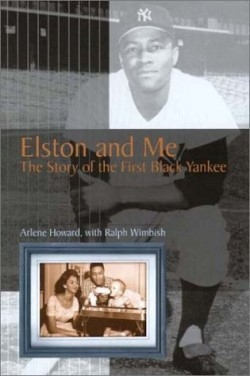
Elston and Me
The Story of the First Black Yankee
Elston Howard had much better timing on the baseball diamond than off it. The first black New York Yankee—a solid catcher with a lifetime fielding average of .993 who was voted the American League’s Most Valuable Player in 1963—missed the big salaries of today’s free agent market. Although he played fourteen seasons for the Yankees (before he was traded to the Boston Red Sox), and won the Babe Ruth Award for most valuable player during the 1958 World Series, he was overshadowed by Jackie Robinson and other black ballplayers who were accepted into the major leagues long before Howard made his entrance.
Howard shunned the limelight, helping to ensure that, today, he’s barely a memory. The author, who was married to him for twenty-six years, attempts to correct that condition with this memorial to her late husband. Although it is flawed by her sometimes irrelevant, sometimes nasty observations, the book provides some illuminating insights into what went on in the Yankees clubhouse during an era in which journalists studiously ignored the clay feet of certain ballplayers. For example, she describes the almost predestined rift between the unassuming Howard and Reggie Jackson, who never hesitated to buff his own star. As Arlene Howard tells it, Jackson insisted on spraying champagne around the clubhouse to celebrate an American League pennant win. Howard asked him to stop, but Jackson persisted. “When he kept on spraying,” she writes, “Elston got off his stool, picked Reggie up, and slam-dunked him into a garbage can.”
By then, Howard was a Yankees coach—the first black man in such a capacity in the American League. He was hired largely because his classy behavior and graceful demeanor were sorely needed by the spoiled, rich ball club. Again, Howard lived in the wrong place at the wrong time: he would certainly have been a major league manager if he had survived longer.
Howard died early, at age fifty-one, of myocarditis, a rare heart disease in which a viral infection weakens the heart muscles. He deserved better out of life but, as his widow’s book describes him, he gave life all he had to give.
Reviewed by
James Abraham
Disclosure: This article is not an endorsement, but a review. The publisher of this book provided free copies of the book to have their book reviewed by a professional reviewer. No fee was paid by the publisher for this review. Foreword Reviews only recommends books that we love. Foreword Magazine, Inc. is disclosing this in accordance with the Federal Trade Commission’s 16 CFR, Part 255.
